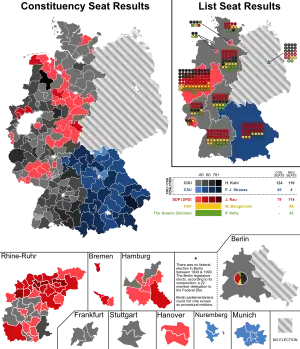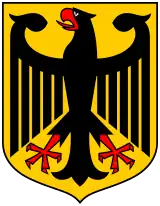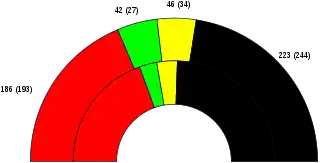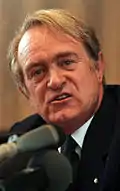1987 West German federal election
Federal elections were held in West Germany on 25 January 1987 to elect the members of the 11th Bundestag. This was the last federal election held in West Germany before German reunification.
| |||||||||||||||||||||||||||||||||||||||||||||||||||||||||||
All 497 seats in the Bundestag[lower-alpha 1] 249 seats needed for a majority | |||||||||||||||||||||||||||||||||||||||||||||||||||||||||||
|---|---|---|---|---|---|---|---|---|---|---|---|---|---|---|---|---|---|---|---|---|---|---|---|---|---|---|---|---|---|---|---|---|---|---|---|---|---|---|---|---|---|---|---|---|---|---|---|---|---|---|---|---|---|---|---|---|---|---|---|
| Registered | 45,327,982 | ||||||||||||||||||||||||||||||||||||||||||||||||||||||||||
| Turnout | 38,225,294 (84.3%) | ||||||||||||||||||||||||||||||||||||||||||||||||||||||||||
| |||||||||||||||||||||||||||||||||||||||||||||||||||||||||||
 The left side shows the winning party vote in the constituencies, the right side shows the seats won by parties in each of the states. The pie chart over West Berlin shows the partisan composition of its legislature. | |||||||||||||||||||||||||||||||||||||||||||||||||||||||||||
| |||||||||||||||||||||||||||||||||||||||||||||||||||||||||||
| This article is part of a series on the |
| Politics of Germany |
|---|
 |
Issues and campaign
The SPD nominated Johannes Rau, their vice chairman and the Minister-President of North Rhine-Westphalia, as their candidate for Chancellor. However, the SPD suffered from internal divisions and competition with the Greens. It was also unclear as to how they would form a government, as the Greens were divided over whether to take part in governments.
One of the major issues in this election was the environment, after the Chernobyl disaster and other accidents.
Results
 | ||||||||||||
|---|---|---|---|---|---|---|---|---|---|---|---|---|
| Party | Party-list | Constituency | Seats | |||||||||
| Votes | % | Seats | Votes | % | Seats | Elected | West Berlin | Total | +/– | |||
| Social Democratic Party | 14,025,763 | 37.04 | 107 | 14,787,953 | 39.18 | 79 | 186 | 7 | 193 | –9 | ||
| Christian Democratic Union | 13,045,745 | 34.45 | 50 | 14,168,527 | 37.54 | 124 | 174 | 11 | 185 | –17 | ||
| Christian Social Union | 3,715,827 | 9.81 | 4 | 3,859,244 | 10.23 | 45 | 49 | 0 | 49 | –4 | ||
| Free Democratic Party | 3,440,911 | 9.09 | 46 | 1,760,496 | 4.66 | 0 | 46 | 2 | 48 | +13 | ||
| Alliance 90/The Greens | 3,126,256 | 8.26 | 42 | 2,649,459 | 7.02 | 0 | 42 | 2 | 44 | +16 | ||
| National Democratic Party | 227,054 | 0.60 | 0 | 182,880 | 0.48 | 0 | 0 | 0 | 0 | 0 | ||
| Ecological Democratic Party | 109,152 | 0.29 | 0 | 40,765 | 0.11 | 0 | 0 | 0 | 0 | 0 | ||
| The Women | 62,904 | 0.17 | 0 | 0 | 0 | 0 | New | |||||
| Bavaria Party | 26,367 | 0.07 | 0 | 8,024 | 0.02 | 0 | 0 | 0 | 0 | 0 | ||
| Responsible Citizens | 24,630 | 0.07 | 0 | 611 | 0.00 | 0 | 0 | 0 | 0 | New | ||
| Patriots for Germany | 22,732 | 0.06 | 0 | 27,352 | 0.07 | 0 | 0 | 0 | 0 | New | ||
| Centre Party | 19,035 | 0.05 | 0 | 4,020 | 0.01 | 0 | 0 | 0 | 0 | New | ||
| Marxist–Leninist Party of Germany | 13,422 | 0.04 | 0 | 596 | 0.00 | 0 | 0 | 0 | 0 | New | ||
| Christian Bavarian People's Party | 5,282 | 0.01 | 0 | 741 | 0.00 | 0 | 0 | 0 | 0 | 0 | ||
| All Social Insurants and Pensioners | 1,834 | 0.00 | 0 | 3,151 | 0.01 | 0 | 0 | 0 | 0 | New | ||
| Free German Workers' Party | 405 | 0.00 | 0 | 349 | 0.00 | 0 | 0 | 0 | 0 | New | ||
| Humanist Party | 788 | 0.00 | 0 | 0 | 0 | 0 | New | |||||
| Solidarity | 754 | 0.00 | 0 | 0 | 0 | 0 | New | |||||
| Independent Workers' Party | 352 | 0.00 | 0 | 0 | 0 | 0 | New | |||||
| Family Party | 130 | 0.00 | 0 | 0 | 0 | 0 | New | |||||
| Free Social Union | 110 | 0.00 | 0 | 0 | 0 | 0 | New | |||||
| Independents and voter groups | 246,511 | 0.65 | 0 | 0 | 0 | 0 | 0 | |||||
| Total | 37,867,319 | 100.00 | 249 | 37,742,813 | 100.00 | 248 | 497 | 22 | 519 | –1 | ||
| Valid votes | 37,867,319 | 99.06 | 37,742,813 | 98.74 | ||||||||
| Invalid/blank votes | 357,975 | 0.94 | 482,481 | 1.26 | ||||||||
| Total votes | 38,225,294 | 100.00 | 38,225,294 | 100.00 | ||||||||
| Registered voters/turnout | 45,327,982 | 84.33 | 45,327,982 | 84.33 | ||||||||
| Source: Bundeswahlleiter | ||||||||||||

Constituency seats
| State | Total seats |
Seats won | ||
|---|---|---|---|---|
| CDU | SPD | CSU | ||
| Baden-Württemberg | 37 | 36 | 1 | |
| Bavaria | 45 | 45 | ||
| Bremen | 3 | 3 | ||
| Hamburg | 7 | 2 | 5 | |
| Hesse | 22 | 14 | 8 | |
| Lower Saxony | 31 | 18 | 13 | |
| North Rhine-Westphalia | 71 | 33 | 38 | |
| Rhineland-Palatinate | 16 | 11 | 5 | |
| Saarland | 5 | 2 | 3 | |
| Schleswig-Holstein | 11 | 8 | 3 | |
| Total | 248 | 124 | 79 | 45 |
List seats
| State | Total seats |
Seats won | ||||
|---|---|---|---|---|---|---|
| SPD | CDU | FDP | Grüne | CSU | ||
| Baden-Württemberg | 37 | 21 | 9 | 7 | ||
| Bavaria | 42 | 24 | 7 | 7 | 4 | |
| Bremen | 4 | 2 | 1 | 1 | ||
| Hamburg | 7 | 1 | 3 | 1 | 2 | |
| Hesse | 23 | 10 | 5 | 4 | 4 | |
| Lower Saxony | 32 | 13 | 8 | 6 | 5 | |
| North Rhine-Westphalia | 72 | 24 | 25 | 12 | 11 | |
| Rhineland-Palatinate | 16 | 7 | 4 | 3 | 2 | |
| Saarland | 5 | 1 | 2 | 1 | 1 | |
| Schleswig-Holstein | 11 | 6 | 1 | 2 | 2 | |
| Total | 249 | 107 | 50 | 46 | 42 | 4 |
Aftermath
The coalition between the CDU/CSU and the FDP returned to government, with Helmut Kohl as Chancellor. The Greens came into parliament for the second time and seemed to be established on federal level.
Co-option of East German Volkskammer after reunification
| |||||||||||||||||||||||||||||||||||||||||
All 641 seats in the Bundestag 321 seats needed for a majority | |||||||||||||||||||||||||||||||||||||||||
| |||||||||||||||||||||||||||||||||||||||||
In order to determine the composition of the East German representatives in the Bundestag between German reunification and the first post-reunification elections in December 1990, the results of the 1990 East German general election were recounted, using the new states of Germany as constituencies. This was possible since the original election results were declared on the Kreis level, and the states were re-established by simply amalgamating Kreise together. The results in each Kreis forming a state were summed up to determine the statewide result. The recount fixed the number of Volkskammer members from each party who would be co-opted into the Bundestag elected in 1987.[1] The 22 Non-voting representatives of West Berlin already became full voting members on 8 June 1990, in advance of unification.
Seats
| State | Total seats |
Seats won | |||||||
|---|---|---|---|---|---|---|---|---|---|
| CDU | SPD | PDS | FDP | DSU | B90/G | VL | |||
| Brandenburg | 22 | 8 | 7 | 4 | 1 | 1 | 1 | ||
| Berlin | Total | 33 | 13 | 11 | 2 | 3 | 1 | 1 | |
| East | 11 | 2 | 4 | 2 | 1 | 1 | 1 | ||
| West | 22 | 11 | 7 | 2 | 2 | ||||
| Mecklenburg-Vorpommern | 17 | 7 | 4 | 4 | 1 | 1 | |||
| Saxony | 43 | 20 | 7 | 6 | 3 | 5 | 2 | ||
| Saxony-Anhalt | 27 | 12 | 7 | 4 | 2 | 1 | 1 | ||
| Thuringia | 24 | 14 | 4 | 3 | 1 | 1 | 1 | ||
| Total (East Germany Only) | 144 | 63 | 33 | 23 | 9 | 8 | 7 | 1 | |
| Total (Including West Berlin) | 166 | 74 | 40 | 23 | 11 | 8 | 9 | 1 | |
Notes
- As well as 22 non-voting delegates for West Berlin, elected by the West Berlin Legislature.
- As well as 11 non-voting delegates for West Berlin.
- As well as 7 non-voting delegates for West Berlin.
- As well as 2 non-voting delegates for West Berlin.
- As well as 2 non-voting delegates for West Berlin.
References
- Mandatsverteilung der ehemaligen Volkskammerabgeordneten im XI. Bundestag am 03.10.1990 Archived 2022-10-03 at the Wayback Machine Wahlen in Deutschland
.jpg.webp)


.jpg.webp)